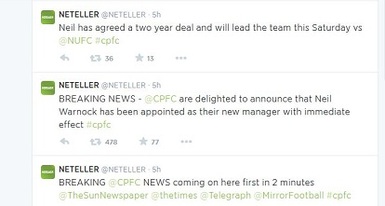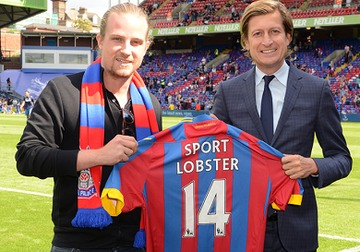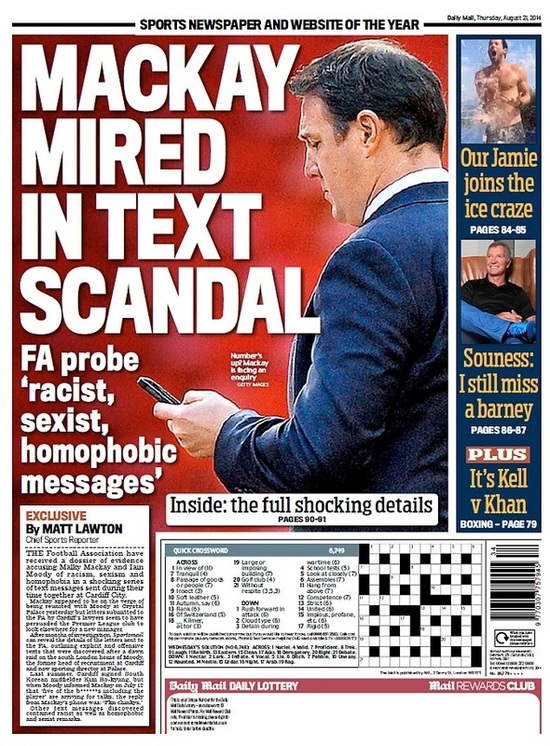If you thought last week’s goings on at Selhurst Park were odd, some of the off-the-pitch developments this week at Crystal Palace have been downright weird as far as sports journalists are concerned.

Can we expect the sports editor of the Sarf London Press to call the Neteller press office next time he wants a quote from Neil Warnock, the man duly anointed as the Palace’s new manager?
Neteller (not to be confused with the delicious hazelnut spread) got the jump on the news, apparently as part of its sponsorship agreement with Palace.
The normally mild-mannered and helpful press team at Selhurst was underwhelmed, as they were informed of this new protocol only shortly before the news was released. “Fuming,” was how Luke Tugby, the club’s press officer, described his reaction (on Twitter, naturally).
Tugby had previously advised his timeline (yeah, that’s what sports reporting has become) that, “Before criticism comes the way of #cpfc, the decision to have Neteller release before the club’s website is out of our hands.”
Neteller operates an online money transfer service. After Warnock was confirmed, they were busy on Twitter again, this time offering those who could be bothered the chance of a meeting with the manager who Palace fans refer to as “Colin” (in an anagramatical manner involving his full name… go on, work it out).
Might this be a harbinger of things to come? Or have sport’s commercial paymasters been managing the message in a more subtle manner for a goodly while, anyway?
It would be good to hear your views.
Established last year, Sportlobster calls itself “the sports social network”, claiming that “… 1.6 million fans have joined the network. Clubs, teams and athletes across a wide and diverse range of sports are using the platform to engage with fans”.
Basically, it’s an attempt at a Facebook for sport.
 Palace's Steve Parish, right, welcomes Sportlobster Arron Shepherd
Palace's Steve Parish, right, welcomes Sportlobster Arron Shepherd Sounds like a media outlet paying money for exclusive access.
Another view of Sportlobster is that it is a sports blog with some money behind it, which makes a lot of use of “user generated content” – or publishes almost anything that the fans of a club might submit, with little editorial interference.
"We are absolutely delighted to become the club’s official social media partner,” was what Arron Shepherd, the co-founder of Sportlobster, was supposed to have said when the deal was announced, according to a press release issued by the site.
“The club are absolutely delighted to be working in this sector in partnership with Sportlobster,” is what the Palace co-chairman, Steve Parish, is supposed to have said, according to the same press release.
The fans, meanwhile, seem less than “absolutely delighted”.
When last we checked, the Crystal Palace page of the Sportlobster site had fewer than 1,700 subscribers. More than 24,000 turned up at Selhurst Park for Palace’s first home league game last weekend.
Despite online links to Sportlobster being pushed out by the Palace communications team’s social media accounts – 127,000 people follow the club’s official Twitter feed – the uptake for Sportlobster so far appears a little modest. And that might be with good reason.
Like most top-flight clubs, Palace already has a dedicated band of supporters who generate fanzines, websites and podcasts, mostly of pretty decent quality and well-informed. And very well-read, too: one fanzine has 10,000 Twitter followers. Some of the fanzines even provide columns for the local weekly newspapers, of which there are three, plus the Evening Standard.
None of these outlets demands of their readers that they should permit them full, unfettered access to their Twitter timelines, to see who they follow and who follow them, or require that they should be able to update the subscriber’s profile or even post tweets for them. But Sportlobster does.
Any Palace fan signing on to Sportlobster through their Faustbook account will grant them access to their public profile, their friends list, their email address and other personal details.
It all has the appearance of a not-too-sophisticated data-scraping exercise.
Anyone who has the slightest reservations about the amount of personal information they share online with unaccountable third parties will in all likelihood avoid registering with Sportlobster.
And if it makes them feel any better, they need not worry too much: from what we’ve seen on the site, they’re not missing much.








 RSS Feed
RSS Feed


